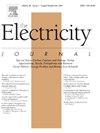Heatwaves and hardship: Shortcomings and solutions for enhancing the low income home energy assistance program to mitigate extreme heat and energy insecurity
IF 2.2
Q1 Social Sciences
引用次数: 0
Abstract
The Low Income Home Energy Assistance Program (LIHEAP) must adapt and evolve to keep pace with the challenges posed by climate change and increased economic strain. Urgent action is needed to improve LIHEAP to effectively address extreme heat and energy insecurity faced by low-income households and protect the health and well-being of disadvantaged groups spurred by climate change. In evaluating LIHEAP’s shortcomings, we demonstrate that there is a substantial gap between program eligibility and enrollment, such that many households are not receiving this vital benefit or do so mainly when facing a crisis. We also show that LIHEAP funds overwhelmingly support cold-weather states even as record-breaking heat is a critical stressor. The spatial mismatch we unveil shows that southern states receive less LIHEAP funds despite higher cooling degree days and higher rates of energy insecurity. The importance of swift action based on sound data and up-to-date research can enhance the efficacy of LIHEAP, expand its reach, and ultimately improve the living conditions of millions of energy insecure households. We offer several recommendations to improve LIHEAP to ensure that this critical lifeline program remains an effective tool to mitigate energy insecurity and safeguard livelihoods in the face of extreme heat.
热浪与困难:加强低收入家庭能源援助计划以缓解极端高温和能源不安全问题的不足与解决方案
低收入家庭能源援助计划(LIHEAP)必须不断调整和发展,以应对气候变化和经济压力增加所带来的挑战。我们亟需采取行动改进低收入家庭能源援助计划,以有效解决低收入家庭面临的极端高温和能源不安全问题,并保护因气候变化而处于不利地位的群体的健康和福祉。在对 LIHEAP 的不足之处进行评估时,我们发现在项目资格和注册人数之间存在巨大差距,因此许多家庭并未享受到这一重要福利,或者主要是在面临危机时才享受到这一福利。我们还表明,尽管破纪录的高温是一个关键的压力因素,但 LIHEAP 的资金绝大部分都用于支持寒冷地区。我们揭示的空间错配现象表明,尽管南方各州的降温度日数更高,能源不安全率更高,但它们获得的 LIHEAP 资金却更少。在可靠数据和最新研究的基础上迅速采取行动的重要性,可以提高 LIHEAP 的效率,扩大其覆盖范围,并最终改善数百万能源无保障家庭的生活条件。我们提出了几项改进 LIHEAP 的建议,以确保这一重要的生命线计划在面对极端高温天气时仍能成为缓解能源不安全和保障生计的有效工具。
本文章由计算机程序翻译,如有差异,请以英文原文为准。
求助全文
约1分钟内获得全文
求助全文
来源期刊

Electricity Journal
Business, Management and Accounting-Business and International Management
CiteScore
5.80
自引率
0.00%
发文量
95
审稿时长
31 days
期刊介绍:
The Electricity Journal is the leading journal in electric power policy. The journal deals primarily with fuel diversity and the energy mix needed for optimal energy market performance, and therefore covers the full spectrum of energy, from coal, nuclear, natural gas and oil, to renewable energy sources including hydro, solar, geothermal and wind power. Recently, the journal has been publishing in emerging areas including energy storage, microgrid strategies, dynamic pricing, cyber security, climate change, cap and trade, distributed generation, net metering, transmission and generation market dynamics. The Electricity Journal aims to bring together the most thoughtful and influential thinkers globally from across industry, practitioners, government, policymakers and academia. The Editorial Advisory Board is comprised of electric industry thought leaders who have served as regulators, consultants, litigators, and market advocates. Their collective experience helps ensure that the most relevant and thought-provoking issues are presented to our readers, and helps navigate the emerging shape and design of the electricity/energy industry.
 求助内容:
求助内容: 应助结果提醒方式:
应助结果提醒方式:


